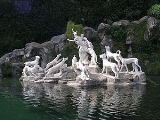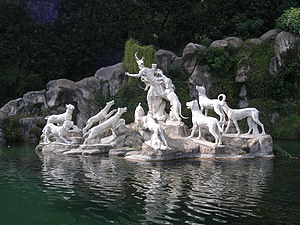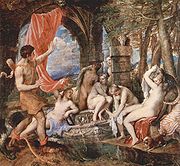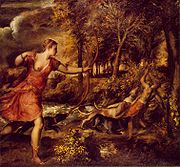
Actaeon
Encyclopedia

Greek mythology
Greek mythology is the body of myths and legends belonging to the ancient Greeks, concerning their gods and heroes, the nature of the world, and the origins and significance of their own cult and ritual practices. They were a part of religion in ancient Greece...
, son of the priestly herdsman Aristaeus
Aristaeus
A minor god in Greek mythology, which we read largely through Athenian writers, Aristaeus or Aristaios , "ever close follower of the flocks", was the culture hero credited with the discovery of many useful arts, including bee-keeping; he was the son of Apollo and the huntress Cyrene...
and Autonoe
Autonoe
In Greek mythology, Autonoë was a daughter of Cadmus, founder of Thebes, Greece, and the goddess Harmonia. She was the wife of Aristaeus and mother of Actaeon and possibly Macris...
in Boeotia
Boeotia
Boeotia, also spelled Beotia and Bœotia , is one of the regional units of Greece. It is part of the region of Central Greece. It was also a region of ancient Greece. Its capital is Livadeia, the second largest city being Thebes.-Geography:...
, was a famous Theban
Thebes, Greece
Thebes is a city in Greece, situated to the north of the Cithaeron range, which divides Boeotia from Attica, and on the southern edge of the Boeotian plain. It played an important role in Greek myth, as the site of the stories of Cadmus, Oedipus, Dionysus and others...
hero
Greek hero cult
Hero cults were one of the most distinctive features of ancient Greek religion. In Homeric Greek, "hero" refers to a man who was fighting on either side during the Trojan War...
. Like Achilles
Achilles
In Greek mythology, Achilles was a Greek hero of the Trojan War, the central character and the greatest warrior of Homer's Iliad.Plato named Achilles the handsomest of the heroes assembled against Troy....
in a later generation, he was trained by the centaur Chiron
Chiron
In Greek mythology, Chiron was held to be the superlative centaur among his brethren.-History:Like the satyrs, centaurs were notorious for being wild and lusty, overly indulgent drinkers and carousers, given to violence when intoxicated, and generally uncultured delinquents...
.
He fell to the fatal wrath of Artemis
Artemis
Artemis was one of the most widely venerated of the Ancient Greek deities. Her Roman equivalent is Diana. Some scholars believe that the name and indeed the goddess herself was originally pre-Greek. Homer refers to her as Artemis Agrotera, Potnia Theron: "Artemis of the wildland, Mistress of Animals"...
, but the surviving details of his transgression vary: "the only certainty is in what Aktaion suffered, his πάθος
Pathos
Pathos represents an appeal to the audience's emotions. Pathos is a communication technique used most often in rhetoric , and in literature, film and other narrative art....
, and what Artemis did: the hunter became the hunted; he was transformed into a stag
STAG
STAG: A Test of Love is a reality TV show hosted by Tommy Habeeb. Each episode profiles an engaged couple a week or two before their wedding. The cameras then follow the groom on his bachelor party...
, and his raging hounds, struck with a 'wolf's frenzy' (λύσσα
Lyssa
In Greek mythology, Lyssa was the spirit of mad rage, frenzy and rabies in animals. She was closely related to the Maniae, the goddesses of madness and insanity. Her Roman equivalent was variously named Ira, Furor, or Rabies...
), tore him apart as they would a stag." This is the iconic motif by which Actaeon is recognized, both in ancient art and in Renaissance and post-Renaissance depictions.
The plot
Among others, John Heath has observed, "The unalterable kernel of the taleMytheme
In the study of mythology, a mytheme is the essential kernel of a myth—an irreducible, unchanging element, a minimal unit that is always found shared with other, related mythemes and reassembled in various ways—"bundled" was Claude Lévi-Strauss's image— or linked in more...
was a hunter's transformation into a deer and his death in the jaws of his hunting dogs. But authors were free to suggest different motives for his death." In the version that was offered by the Hellenistic poet Callimachus
Callimachus
Callimachus was a native of the Greek colony of Cyrene, Libya. He was a noted poet, critic and scholar at the Library of Alexandria and enjoyed the patronage of the Egyptian–Greek Pharaohs Ptolemy II Philadelphus and Ptolemy III Euergetes...
, which has become the standard setting, Artemis was bathing in the woods when the hunter Actaeon stumbled across her, thus seeing her naked. He stopped and stared, amazed at her ravishing beauty. Once seen, Artemis punished Actaeon: she forbade him speech — if he tried to speak, he would be changed into a stag
Deer (mythology)
Deer have significant roles in the mythology of various peoples.-Celtic:The Insular Celts held deer as supernatural animals, "fairy cattle" that were herded and milked by a localised and benevolent fairy giantess in each district, who could shift shape to that of a red deer; in the West...
— for the unlucky profanation of her virginity's mystery. Upon hearing the call of his hunting party, he cried out to them and immediately was changed into a stag. His own hounds then turned upon him and tore him to pieces, not recognizing him. An element of the earlier myth made Actaeon the familiar hunting companion of Artemis, no stranger. In an embroidered extension of the myth, the hounds were so upset with their master's death, that Chiron
Chiron
In Greek mythology, Chiron was held to be the superlative centaur among his brethren.-History:Like the satyrs, centaurs were notorious for being wild and lusty, overly indulgent drinkers and carousers, given to violence when intoxicated, and generally uncultured delinquents...
made a statue so lifelike that the hounds thought it was Actaeon.

Bibliotheca (Pseudo-Apollodorus)
The Bibliotheca , in three books, provides a comprehensive summary of traditional Greek mythology and heroic legends, "the most valuable mythographical work that has come down from ancient times," Aubrey Diller observed, whose "stultifying purpose" was neatly expressed in the epigram noted by...
states that his offense was that he was a rival of Zeus
Zeus
In the ancient Greek religion, Zeus was the "Father of Gods and men" who ruled the Olympians of Mount Olympus as a father ruled the family. He was the god of sky and thunder in Greek mythology. His Roman counterpart is Jupiter and his Etruscan counterpart is Tinia.Zeus was the child of Cronus...
for Semele
Semele
Semele , in Greek mythology, daughter of the Boeotian hero Cadmus and Harmonia, was the mortal mother of Dionysus by Zeus in one of his many origin myths. In another version of his mythic origin, he is the son of Persephone...
, his mother's sister, whereas in Euripides
Euripides
Euripides was one of the three great tragedians of classical Athens, the other two being Aeschylus and Sophocles. Some ancient scholars attributed ninety-five plays to him but according to the Suda it was ninety-two at most...
' Bacchae he has boasted that he is a better hunter than Artemis:
|
|
Further materials, including fragments that belong with the Hesiodic Catalogue of Women
Catalogue of Women
thumb|275px|[[Guido Reni]]'s first Atalanta e Ippomene , depicting the race of [[Atalanta]], a myth which was known to Reni from [[Ovid]]'s [[Metamorphoses]], but is now also represented by several fragments of the Catalogue of Women.The Catalogue of Women —also known as...
and at least four Attic tragedies, including a Toxotides of Aeschylus
Aeschylus
Aeschylus was the first of the three ancient Greek tragedians whose work has survived, the others being Sophocles and Euripides, and is often described as the father of tragedy. His name derives from the Greek word aiskhos , meaning "shame"...
, have been lost. Diodorus Siculus
Diodorus Siculus
Diodorus Siculus was a Greek historian who flourished between 60 and 30 BC. According to Diodorus' own work, he was born at Agyrium in Sicily . With one exception, antiquity affords no further information about Diodorus' life and doings beyond what is to be found in his own work, Bibliotheca...
(4.81.4), in a variant of Actaeon's hubris
Hubris
Hubris , also hybris, means extreme haughtiness, pride or arrogance. Hubris often indicates a loss of contact with reality and an overestimation of one's own competence or capabilities, especially when the person exhibiting it is in a position of power....
that has been largely ignored, has it that Actaeon wanted to marry Artemis. Other authors say the hounds were Artemis' own; some lost elaborations of the myth seem to have given them all names and narrated their wanderings after his loss.
According to the Latin version of the story told by the Roman Ovid
Ovid
Publius Ovidius Naso , known as Ovid in the English-speaking world, was a Roman poet who is best known as the author of the three major collections of erotic poetry: Heroides, Amores, and Ars Amatoria...
having accidentally seen Diana (Artemis) on Mount Cithaeron while she was bathing, he was changed by her into a stag, and pursued and killed by his fifty hounds. This version also appears in Callimachus' Fifth Hymn, as a mythical parallel to the blinding of Tiresias
Tiresias
In Greek mythology, Tiresias was a blind prophet of Thebes, famous for clairvoyance and for being transformed into a woman for seven years. He was the son of the shepherd Everes and the nymph Chariclo; Tiresias participated fully in seven generations at Thebes, beginning as advisor to Cadmus...
after he sees Athena bathing.
The literary testimony of Actaeon's myth is largely lost, but Lamar Ronald Lacy, deconstructing the myth elements
Mytheme
In the study of mythology, a mytheme is the essential kernel of a myth—an irreducible, unchanging element, a minimal unit that is always found shared with other, related mythemes and reassembled in various ways—"bundled" was Claude Lévi-Strauss's image— or linked in more...
in what survives and supplementing it by iconographic evidence in late vase-painting, made a plausible reconstruction of an ancient Actaeon myth that Greek poets may have inherited and subjected to expansion and dismemberment. His reconstruction opposes a too-pat consensus that has an archaic Actaeon aspiring to Semele
Semele
Semele , in Greek mythology, daughter of the Boeotian hero Cadmus and Harmonia, was the mortal mother of Dionysus by Zeus in one of his many origin myths. In another version of his mythic origin, he is the son of Persephone...
, a classical Actaeon boasting of his hunting prowess and a Hellenistic Actaeon glimpsing Artemis' bath. Lacy identifies the site of Actaeon's transgression as a spring sacred to Artemis at Plataea
Plataea
Plataea or Plataeae was an ancient city, located in Greece in southeastern Boeotia, south of Thebes. It was the location of the Battle of Plataea in 479 BC, in which an alliance of Greek city-states defeated the Persians....
where Actaeon was a hero archegetes
Greek hero cult
Hero cults were one of the most distinctive features of ancient Greek religion. In Homeric Greek, "hero" refers to a man who was fighting on either side during the Trojan War...
("hero-founder") The righteous hunter, the companion of Artemis, seeing her bathing naked at the spring, was moved to try to make himself her consort, as Diodorus Siculus
Diodorus Siculus
Diodorus Siculus was a Greek historian who flourished between 60 and 30 BC. According to Diodorus' own work, he was born at Agyrium in Sicily . With one exception, antiquity affords no further information about Diodorus' life and doings beyond what is to be found in his own work, Bibliotheca...
noted, and was punished, in part for transgressing the hunter's "ritually enforced deference to Artemis" (Lacy 1990:42).
Names of the dogs who devoured Actaeon
The following list is as given in Hyginus' Fabulae. The first part of the list is taken from Ovid's Metamorphoses (Book III, 206 - 235), and the second from an unknown source.Note: In the first part of the list, Hyginus fails to correctly differentiate between masculine and feminine names.
According to Ovid
Dogs: Melampus, Ichnobates, [Echnobas], Pamphagos, Dorceus, Oribasus, Nebrophonus, Laelap, Theron, Pterelas, Hylaeus, Nape, Ladon, Poemenis, [Therodanapis], Aura, Lacon, Harpyia, Aello, Dromas, Thous Canache, Cyprius, Sticcte, Labros, Arcas, Agriodus, Tigris, Hylactor, Alce, Harpalus, Lycisca, Melaneus, Lachne, Leucon.
Bitches: Melanchaetes, Agre, Theridamas, Oresitrophos.
Authors other than Ovid
Dogs: Acamas, Syrus, Leon, Stilbon, Agrius, Charops, Aethon, Corus, Boreas, Draco, Eudromus, Dromius, Zephyrus, Lampus, Haemon, Cyllopodes, Harpalicus, Machimus, Ichneus, Melampus, Ocydromus, Borax, Ocythous, Pachylus, Obrimus;
Bitches: Argo, Arethusa, Urania, Theriope, Dinomache, Dioxippe, Echione, Gorgo, Cyllo, Harpyia, Lynceste, Leaena, Lacaena, Ocypete, Ocydrome, Oxyrhoe, Orias, *Sagnos, Theriphone, *Volatos, *Chediaetros.
The "bed of Actaeon"
In the second century CE, the traveller PausaniasPausanias (geographer)
Pausanias was a Greek traveler and geographer of the 2nd century AD, who lived in the times of Hadrian, Antoninus Pius and Marcus Aurelius. He is famous for his Description of Greece , a lengthy work that describes ancient Greece from firsthand observations, and is a crucial link between classical...
was shown a spring on the road in Attica
Attica
Attica is a historical region of Greece, containing Athens, the current capital of Greece. The historical region is centered on the Attic peninsula, which projects into the Aegean Sea...
leading to Plataea
Plataea
Plataea or Plataeae was an ancient city, located in Greece in southeastern Boeotia, south of Thebes. It was the location of the Battle of Plataea in 479 BC, in which an alliance of Greek city-states defeated the Persians....
from Eleutherae
Eleutherae
Eleutherae is a city in the northern part of Attica, bordering the territory of Boeotia. One of the best preserved fortresses of the Ancient Greece stands now on the spot of Ancient Eleutherae with walls of very fine masonry that average 2.6m thick. A stretch of wall 206m long containing six...
, just beyond Megara
Megara
Megara is an ancient city in Attica, Greece. It lies in the northern section of the Isthmus of Corinth opposite the island of Salamis, which belonged to Megara in archaic times, before being taken by Athens. Megara was one of the four districts of Attica, embodied in the four mythic sons of King...
"and a little farther on a rock. It is called the bed of Actaeon, for it is said that he slept thereon when weary with hunting, and that into this spring he looked while Artemis was bathing in it.

Parallels in Akkadian and Ugarit poems
In the standard version of the Epic of GilgameshEpic of Gilgamesh
Epic of Gilgamesh is an epic poem from Mesopotamia and is among the earliest known works of literature. Scholars believe that it originated as a series of Sumerian legends and poems about the protagonist of the story, Gilgamesh king of Uruk, which were fashioned into a longer Akkadian epic much...
(tablet vi) there is a parallel, in the series of examples Gilgamesh
Gilgamesh
Gilgamesh was the fifth king of Uruk, modern day Iraq , placing his reign ca. 2500 BC. According to the Sumerian king list he reigned for 126 years. In the Tummal Inscription, Gilgamesh, and his son Urlugal, rebuilt the sanctuary of the goddess Ninlil, in Tummal, a sacred quarter in her city of...
gives Ishtar
Ishtar
Ishtar is the Assyrian and Babylonian goddess of fertility, love, war, and sex. She is the counterpart to the Sumerian Inanna and to the cognate north-west Semitic goddess Astarte.-Characteristics:...
of her mistreatment of her serial lovers:
You loved the herdsman, shepherd and chief shepherd
Who was always heaping up the glowing ashes for you,
And cooked ewe-lambs for you every day.
But you hit him and turned him into a wolf,
His own herd-boys hunt him down
And his dogs tear at his haunches.
Actaeon, torn apart by dogs incited by Artemis, finds another Near Eastern parallel in the Ugarit
Ugarit
Ugarit was an ancient port city in the eastern Mediterranean at the Ras Shamra headland near Latakia, Syria. It is located near Minet el-Beida in northern Syria. It is some seven miles north of Laodicea ad Mare and approximately fifty miles east of Cyprus...
ic hero Aqht, torn apart by eagles incited by Anath who wanted his hunting bow.
The virginal Artemis of classical times is not directly comparable to Ishtar of the many lovers, but the mytheme
Mytheme
In the study of mythology, a mytheme is the essential kernel of a myth—an irreducible, unchanging element, a minimal unit that is always found shared with other, related mythemes and reassembled in various ways—"bundled" was Claude Lévi-Strauss's image— or linked in more...
of Artemis shooting Orion
Orion (mythology)
Orion was a giant huntsman in Greek mythology whom Zeus placed among the stars as the constellation of Orion....
, was linked to her punishment of Actaeon by T.C.W. Stinton; the Greek context of the mortal's reproach to the amorous goddess is translated to the episode of Anchises
Anchises
In Greek mythology, Anchises was the son of Capys and Themiste . His major claim to fame in Greek mythology is that he was a mortal lover of the goddess Aphrodite . One version is that Aphrodite pretended to be a Phrygian princess and seduced him for nearly two weeks of lovemaking...
and Aphrodite
Aphrodite
Aphrodite is the Greek goddess of love, beauty, pleasure, and procreation.Her Roman equivalent is the goddess .Historically, her cult in Greece was imported from, or influenced by, the cult of Astarte in Phoenicia....
. Daphnis
Daphnis
In Greek mythology, Daphnis was a son of Hermes and a Sicilian nymph. A shepherd and flautist, he was the inventor of pastoral poetry. A naiad fell in love with him, but he was not faithful to her. In revenge, she either blinded him or turned him to stone...
too was a herdsman loved by a goddess and punished by her: see Theocritus
Theocritus
Theocritus , the creator of ancient Greek bucolic poetry, flourished in the 3rd century BC.-Life:Little is known of Theocritus beyond what can be inferred from his writings. We must, however, handle these with some caution, since some of the poems commonly attributed to him have little claim to...
' First Idyll.
Actaeon in art
- AeschylusAeschylusAeschylus was the first of the three ancient Greek tragedians whose work has survived, the others being Sophocles and Euripides, and is often described as the father of tragedy. His name derives from the Greek word aiskhos , meaning "shame"...
and other tragic poets made use of the story, which was a favourite subject in ancient works of art. - There is a well-known small marble group in the British MuseumBritish MuseumThe British Museum is a museum of human history and culture in London. Its collections, which number more than seven million objects, are amongst the largest and most comprehensive in the world and originate from all continents, illustrating and documenting the story of human culture from its...
illustrative of the story, in gallery 83/84. - Two paintings by the 16th century painter TitianTitianTiziano Vecelli or Tiziano Vecellio Tiziano Vecelli or Tiziano Vecellio Tiziano Vecelli or Tiziano Vecellio (c. 1488/1490 – 27 August 1576 better known as Titian was an Italian painter, the most important member of the 16th-century Venetian school. He was born in Pieve di Cadore, near...
(Acteon and Diana and ActaeonDiana and Actaeon (Titian)Diana and Actaeon is a painting by the Italian Renaissance master Titian, finished in 1556–1559, and is considered amongst Titian's greatest works. It portrays the moment in which the goddess Diana meets Actaeon. In 2008–2009, the National Gallery, London and National Gallery of Scotland...
). - ActéonActéonActéon is a Pastorale in the form of a miniature tragédie en musique in six scenes by Marc-Antoine Charpentier, Opus H 481, based on a Greek myth.-History:...
, an operatic pastorale by Marc-Antoine CharpentierMarc-Antoine CharpentierMarc-Antoine Charpentier, , was a French composer of the Baroque era.Exceptionally prolific and versatile, he produced compositions of the highest quality in several genres...
. - Percy Bysshe ShelleyPercy Bysshe ShelleyPercy Bysshe Shelley was one of the major English Romantic poets and is critically regarded as among the finest lyric poets in the English language. Shelley was famous for his association with John Keats and Lord Byron...
suggests a parallel between his alter-ego and Actaeon in his elegy for John KeatsJohn KeatsJohn Keats was an English Romantic poet. Along with Lord Byron and Percy Bysshe Shelley, he was one of the key figures in the second generation of the Romantic movement, despite the fact that his work had been in publication for only four years before his death.Although his poems were not...
, AdonaisAdonaisAdonaïs: An Elegy on the Death of John Keats, Author of Endymion, Hyperion, etc. , also spelled Adonaies, is a pastoral elegy written by Percy Bysshe Shelley for John Keats in 1821, and widely regarded as one of Shelley's best and most well-known works...
, stanza 31 ('[he] had gazed on Nature's naked loveliness/ Actaeon-like, and now he fled astray/ .../ And his own thoughts, along that rugged way,/ Pursued, like raging hands, their father and their prey.') - The aria "Oft she visits this lone mountain" from Purcell'sHenry PurcellHenry Purcell – 21 November 1695), was an English organist and Baroque composer of secular and sacred music. Although Purcell incorporated Italian and French stylistic elements into his compositions, his legacy was a uniquely English form of Baroque music...
Dido and AeneasDido and AeneasDido and Aeneas is an opera in a prologue and three acts by the English Baroque composer Henry Purcell to a libretto by Nahum Tate. The first known performance was at Josias Priest's girls' school in London no later than the summer of 1688. The story is based on Book IV of Virgil's Aeneid...
, first performed in 1689 or earlier. - Giordano BrunoGiordano BrunoGiordano Bruno , born Filippo Bruno, was an Italian Dominican friar, philosopher, mathematician and astronomer. His cosmological theories went beyond the Copernican model in proposing that the Sun was essentially a star, and moreover, that the universe contained an infinite number of inhabited...
, "Gli Eroici Furori". - In canto V of G. B Marino's poem "AdoneADONEADONE was the first high-energy particle collider. It was operated from 1969 to 1993, by the National Institute of Nuclear Physics, in Frascati, Italy.-See also:*ADA collider*Laboratori Nazionali di Frascati...
" the protagonist goes to theater to see a tragedy representing the myth of Actaeon. This episode foreshadows the protagonist's violent death at the end of the book. - In Act I Scene 2 of Jacques OffenbachJacques OffenbachJacques Offenbach was a Prussian-born French composer, cellist and impresario. He is remembered for his nearly 100 operettas of the 1850s–1870s and his uncompleted opera The Tales of Hoffmann. He was a powerful influence on later composers of the operetta genre, particularly Johann Strauss, Jr....
's Orpheus in the UnderworldOrpheus in the UnderworldOrphée aux enfers is an opéra bouffon , or opéra féerie in its revised version, by Jacques Offenbach. The French text was written by Ludovic Halévy and later revised by Hector-Jonathan Crémieux....
Actaeon is Diana (Artemis)'s lover, and it is Jupiter who turns him into a stag, which puts Diana off hunting. His story is reliquished at this point, in favour of the other plots. - Ted HughesTed HughesEdward James Hughes OM , more commonly known as Ted Hughes, was an English poet and children's writer. Critics routinely rank him as one of the best poets of his generation. Hughes was British Poet Laureate from 1984 until his death.Hughes was married to American poet Sylvia Plath, from 1956 until...
wrote a version of the story in his Tales from OvidTales from OvidTales from Ovid is a poetical work written by the English poet Ted Hughes. Published in 1997 by Faber and Faber, it is a retelling of twenty-four tales from Ovid's Metamorphoses. It won the Whitbread Book Of The Year Award for 1997 and has been translated into several languages. It was one of his...
.

